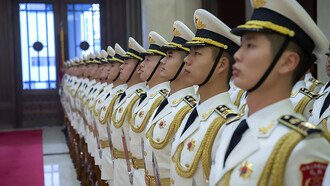On the 27th of April, 1994, a new dawn was witnessed in a country historically known for the most brutal and dehumanising political epochs in the recorded history of mankind. On that memorable day, millions of people, majority of them Black and indigenous inhabitants of the land, made their way to the polling stations across the lengths and breadths of the country. Joy and happiness were written all over the faces of those who patiently waited in long queues to make their voices heard through the ballot box. They were eager to vote for a government of their choice. Foremost in their minds was to pledge and affirm their allegiance to their political parties and their representative leaders who appeared in the ballot papers whom they intended to entrust with the responsibility to change their lives for better. In 1994, the majority of South Africans had in their minds their Israelites-like moment of liberation from the heavy-handedness of the Egyptian kind, which was in their context the apartheid regime.
It has been 30 years since April 1994 gave birth to a “new” South Africa. The analysis of the political history of many countries, especially developing countries in Africa and the global South, provides a potpourri of results when analysing the changes in the political systems from military rule, autocratic or authoritarian systems, to constitutional democracies. Independence has been a peaceful transfer of power in some countries, from one administration to the other, or from one president to the other, or even from one political party to a new party. Countries like Zambia experienced the dismantling of former liberation movements, or political parties to new parties and coalition formations. In other countries such as Uganda, Equatorial Guinea, Cameroon, and others, there have been presidents who have been in office for more than 30 to 40 years.
In the case of South Africa, in the past 30 years the country has witnessed the inauguration of five presidents, albeit one of them served as a cater-taker for a short term of less than a year. It is however commendable that unlike in many other African and developing countries, South Africa has experienced low-intensity post-elections conflicts rejecting the outcomes, and these were peacefully resolved through the legal and judicial systems in place. The country has not experienced a period of political paralysis or collapse of government — not even deterioration of national security and political stability due to post election violent conflicts as witnessed in neighbouring states in the region, on the African continent, and elsewhere.
Democracy is largely understood as the political system in which the government is voted into office by most people through their free will or by choice. In 1994, a solid 30 years ago, South Africa’s majority population of all racial groups exercised this inalienable right to choose who will govern their country, champion their developmental cause, and take charge of their national resources and assets. The political party that emerged victorious in the 1994 all-inclusive and democratic elections was the African National Congress (ANC), which is still in power till the general elections on the 29th of May, 2024, subject to the outcomes thereof.
For the past three decades, most members of the population who were dispossessed of their productive land, deprived of all kinds of human rights, be it political, economic, social or cultural, put their faith in the government to restore their human dignity. Hoping that the government they voted for will, inter alia, affirm and confer their rights and other privileges enjoyed by citizens of a politically free country. To what extent this has been achieved in the past 30 years remains a very subjective matter, and opinions are biased in favour of the achievements by those who are in power and the supporters of the ruling party. In the same vein, the opposition parties and their proponents have a very different take on the state of the nation since 1994.
As legitimately expected by the populace, the ANC government developed, formulated, and implemented numerous public policies aimed at addressing and redressing the injustices of the past whilst simultaneously mapping a new path for the country’s development. Significant milestones have been achieved on many fronts, cutting across all sectors of society. For example, since 1994, all South Africans enjoy the right and have access to all cities and provinces without the burden of acquiring a pass or government authorisation to relocate and reside in another province. That is the freedom of movement within the borders of the country which was deprived to the majority Black segment of the population. The economy has been significantly deracialised through Black Economic Empowerment, Affirmative Action, Employment Equity, and Labour Relations legislations, policies, and other transformational government programmes and interventions. The critical question to be posed is: to what extent have these government initiatives and programmes achieved their desired and intended objectives?
Institutions of higher learning, such as universities, are open to all prospective students from different social and cultural backgrounds — including international students. There are no professional jobs reserved for a particular racial group as it was the case before the 1994 landmark elections. Pre-1994, the percentage of highly educated Black and coloured (mixed blood) people was far below than what it is 30 years on. In this regard, the twenty-year review report of South Africa’s democracy since 1994 states that, “There were few qualified maths and science teachers at Black schools." Furthermore, Black students had restricted access to quality higher education and were prohibited from attending what were considered white universities.
Thus, the review continues, the legacy of the apartheid education and training system is still with us today, in the form of skills shortages and the immense challenge of transforming the education and training system to one capable of producing the skills required by a rapidly growing economy. As a consequence of this skills shortage, the Department of Home Affairs developed a list of what is called “scarce skills” which is aimed at recruiting experts and well-trained individuals from other countries to support the growth and development of the South African economy. The list gets revised periodically as the now transformed institutions of higher learning improved the production of locally trained and educated professionals.
Many communities, both in urban and rural areas, have benefited from public services such as running water, though sometimes the taps run dry. Low-cost houses have been built by the government and handed over to the designated beneficiaries. In this regard, the 2022 Census Report states that since 1996, there has been an increase in the number of people residing in formal human settlements. The report explains that formal dwellings include formal houses with a brick/concrete structure, flats and apartments, cluster houses, townhouses, semi-detached houses, or any formal dwelling situated in a backyard, such as a room or garden cottage where a household or single person resides. The proportion of households that resided in informal dwellings halved from 16,2% in 1996 to 8,1% in 2022. This is commendable progress.
In the area of basic education, since 1994, the government has implemented commendable reforms which has addressed a number of critical issues that previously hindered access to basic education such as race, sex, language, religion, geographical location, as well as the core school curricula, policies, standards, and norms. Children who reside from poor rural and urban settlements also benefit from the government feeding schemes and scholar transport. Government achievements since 1994 extend to other sectors including free basic healthcare in public hospitals, though some healthcare centres at times run out of the necessary medical supplies. The list of significant government achievements post 1994 is long and inexhaustible.
Notwithstanding the achievements since 1994, much remains to be done. In some parts of the country, since 1994, the government is yet to build basic infrastructure such as tarred roads, bridges, sanitation, and sewerage systems. These include poor or lack of maintenance of the existing infrastructure. The lack of these services or their lacklustre maintenance has been one of the causes for regular citizen protests since 1994. Public transport is another sector in which the government has underperformed, particularly in relation to government-subsidised modes of transport such as trains and buses.
Admittedly, the government has made strides to improve the transport infrastructure, especially for rail networks, and it also introduced new trains. However, the public, when they protest or express their dissatisfaction with the failure of one government policy, burn and destroy the very same infrastructure meant to benefit them. Some of the serious concerns with public transport is that it is not safe and reliable due to crime and missed time schedules. In this context, the government and the people have responsibilities to share both in the failures and some achievements.
One of the critical challenges that confront the nation, besides the widespread service delivery protests, is the prevalence of corruption cases and its allegations and perceptions which have led to a trust deficit between the government and the populace. There are serious shortcomings in the delivery of sustainable public services to households, especially access to clean water, sanitation, and reliable supply of energy, and corruption is at the centre of this conundrum. Corruption has crippled service delivery in multiple ways as the funds meant to procure goods and services for the benefit of the communities are embezzled, used wastefully and fruitlessly. In the 2022 Annual Auditor General’s Report, it is stated that the institution is confronted daily with the continuous misuse of state resources. This is a concerning indictment to the effectiveness, or lack thereof, of government checks and balances, law enforcement, and agency of public institutions.
Other socio-economic challenges the country battles with are related to its foreign policy and international engagements. Since 1994, a number of bilateral and multilateral agreements were signed with many countries. In fact, in the mid to the late 1990s, the government stated its ambition to open diplomatic missions in all of the African countries with the aim to build closer cooperation and partnerships with countries on the continent and beyond. The growing positive influence and growing stature of South Africa on the continent and globally in its foreign policy engagements stimulated strong interests for citizens of other countries to work and live in the seemingly rising country of hope and realisable dreams on the African continent.
The influx of both documented and undocumented people stirred up social cohesion challenges. South Africa is one of the countries in the world that has no refugee camps for people who enter the country illegally or without valid travel documents. The accommodation and social inclusion of foreign nationals, combined with the effects of globalisation that rapidly led to jobless economic growth and accelerated rural-urban migration, compounded the challenges of developing modern, cosmopolitan, and inclusive cities. This has been described as urbanisation of poverty. Thirty years on, the country still battles with issues related to the eradication, or put modestly, alleviation and transformation, of informal settlements and slums. Whether this is achievable at all, is a moot point, especially considering the failed government efforts to build low-cost housing for the urban and rural poor households.
Some beneficiaries of the government's formal human settlements structures exploited them for financial and economic opportunities by either selling them and returning to the slums or renting them out, whilst they went back to join the queue of those still waiting for their houses. In essence, some people rendered the transformation of informal settlements and slums a moving target. Challenging for the government, which also needs a positive contribution and cooperation of the communities, is the question, how best to transform these areas into liveable and habitable areas which can guarantee people their dignity and promote their human rights. Some communities in informal settlements and slums simply refuse to entertain government land reform and relocation initiatives and prefer their slums in situ, refusing transformations. This isn’t feasible in all contexts due to inter alia, lack of land tenure, appropriate town planning, and illegal occupation of land not designed nor suitable for human habitation.
Thirty years on, South Africa still remains ceased with the main challenges that were experienced pre 1994, albeit currently the context has changed. In the economic front, the majority of the successful businesses and listed companies are predominantly owned by white citizens. Some businesses owned by white nationals still prefer to employ their kith and kin as well as foreign nationals who have no employment benefits than to hire Black citizens. Transformation and reforms in the country remain largely political and promoted by a majority Black segment of the population than their white compatriots. Racial tensions are still experienced in some parts of the country such as in white-owned farms, with some territories such as Orania preferring to run their own racially configured fiefdom within the democratic nation.
South Africans of all racial groups and political persuasions ought to come together and reflect on what has been achieved in the past 30 years that has taken the national development agenda forward. It is imperative for South Africans to remember what has worked and what should be amplified and what hasn’t worked and what ought to be changed. Therefore, the decision to celebrate the 30 years of democracy or not, really remains a subjective and value-laden matter. This month, the government has released its 30-year review report, and South Africans and the international observers of the country’s democratic dispensation are going to engage and dissect it from different analytical lenses and perspectives. More articles on this 30-year review will follow in the next editions picking on some specific issues, sectors and topics.















